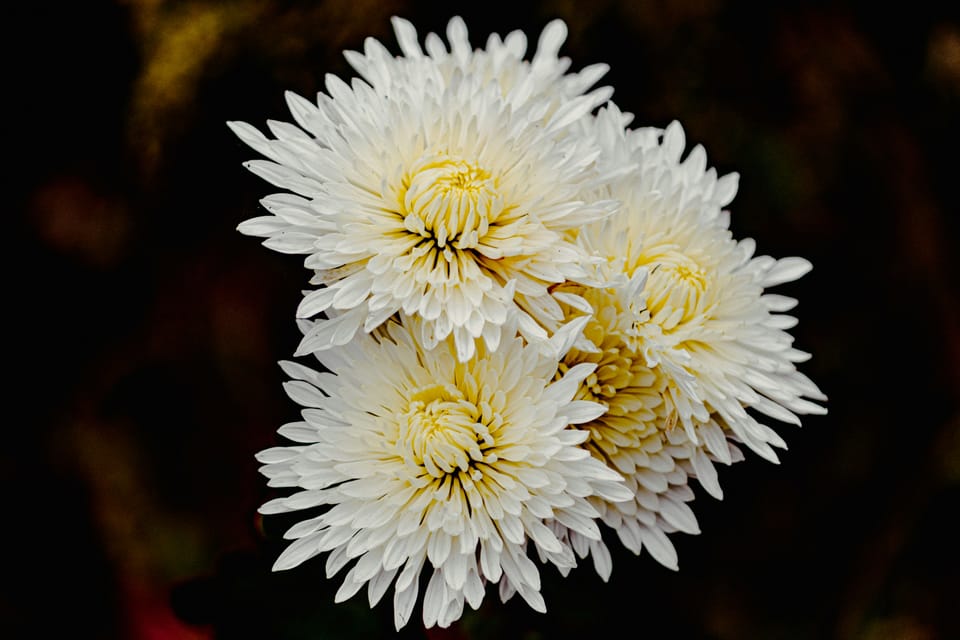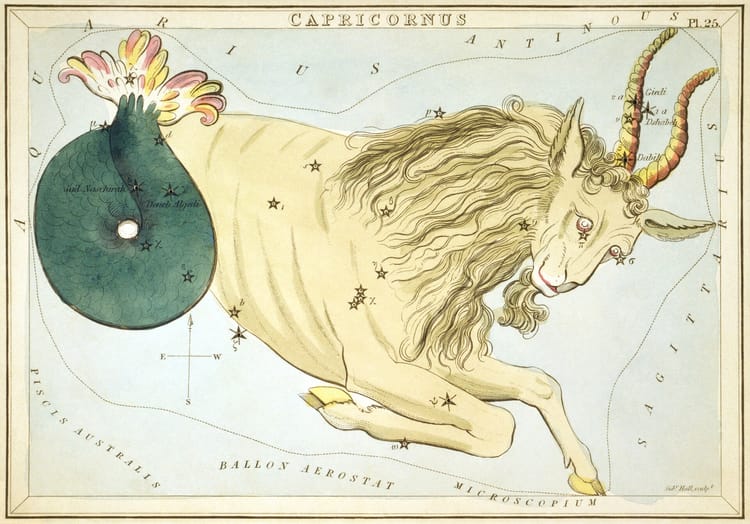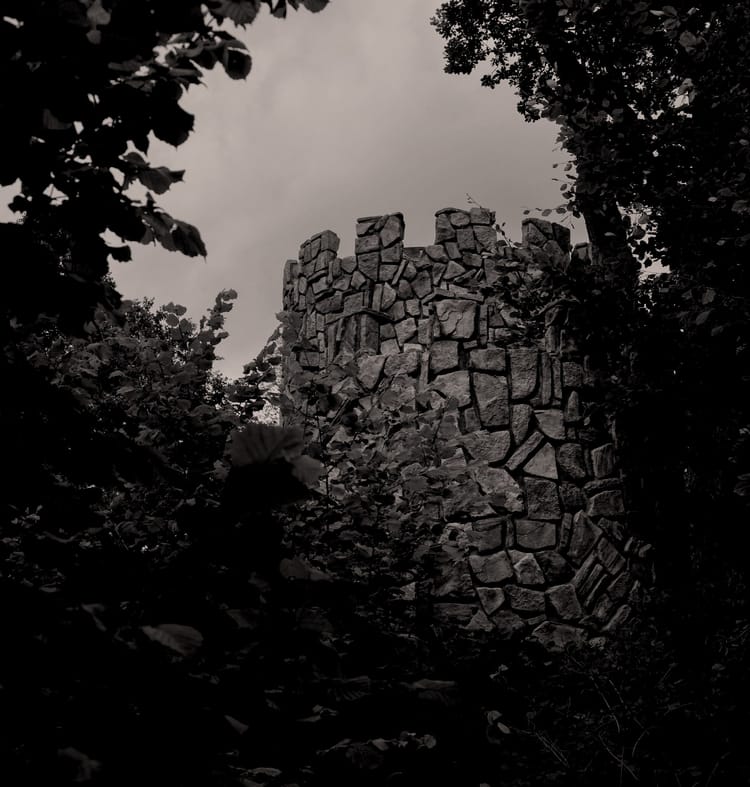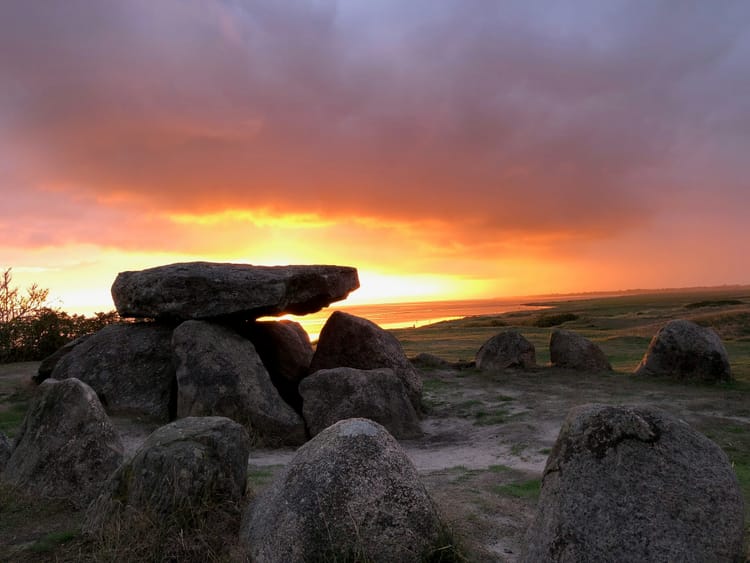Last Quarter: Funerals for the overlooked

Hello. It's Friday, and an abnormally late nor'easter has just swept over this landscape, leaving it appropriately damp for the season but much cooler than we would ever expect for late May. Luckily there wasn't a frost, which would be truly unheard of, but I'm surprised some plants have weathered the experience as well as it seems. Death is always possible, and it often feels like one of my greatest challenges is to learn how to remain aware of that chance without letting it consume my thoughts utterly.
As discussed in various past missives, this struggle is likely a driving force behind why I periodically feel called to incorporate death work into my witchcraft. If I cannot eliminate the fear itself, I can at least expose myself to the source of the fear, build a relationship with it, and not allow the fear to master me. And as I have also mentioned before, one form of death work I have increasingly grown curious about is officiating funerals, because various elements like wordsmithing, public speaking, and ceremony creation come to me very intuitively, and likewise because I care very much about the type of closure that a good funeral provides.
I am giving this even deeper consideration lately. Being unemployed for close to four months now, I face the need to find absolutely anything that will put food on the table, but equally I face the need to pivot my non-writing career toward something that matters to me as much as writing does — not just something I'm "good at." To some extent this all translates to weighing what kinds of ritual work I would feel comfortable offering to others for a compensatory fee or gift donations. And while I see severe ethical prescriptions in that regard, the primary reason I've wound up continuing to look for more mundane jobs — albeit often jobs in important industries for addressing the eco crisis — is that even the most unethical ritual practitioners will not typically turn a profit from their scams right away. No matter how I want to thread that difficult needle, anything I earn will come in slowly to start, and maybe forever. But despite so many disclaimers, now is still a time when I can start that process, and perhaps I should.
To actually become a funeral officiant, I would have to take care of practical matters like learning what kinds of certificates most professional officiants carry these days, and why I might (or might not) benefit from certifying. I would also have to learn how to either offer my services independently or partner with a semi-local funeral home (if any) that shares my values. And I would need to conduct much more of my own personal research into how other people officiate, ideally finding a mentor I could assist for a while since attending more funerals at random would be rather odd. I may start to find out more of this information soon. In the interim, however, I am quite certain that as a potential officiant I would like to develop a specialized focus, and this would be on funerals for overlooked populations, including members of the more-than-human world. The rest of this post is a review of why and how I picture providing funeral service to these groups.
Please note that in addition to the overall chance of death talk stirring strong emotions, there will be direct discussion of animal euthanasia.
Fellow witches, animists, occultists, neopagans, et al., chiefly the unaffiliated
Officiating ritualist-to-ritualist should almost speak for itself, but in my opinion this can create confusion about providing repeated, identical funeral services for an imagined monolithic belief system of "paganism," or about how to classify a funeral officiant for the sorts of ritualists who don't have a priesthood. I would not feel qualified to officiate for a funeral within a culturally specific tradition I didn't belong to, and I can only imagine there would be plenty of other officiators to choose from in that regard; and even outside anything culturally specific, if a deceased person were Wiccan I can only assume it would make sense for their funeral to have a Wiccan officiant unless their will (if they had one) said otherwise. I also do not see myself as a priestess or priestex of any flavor, so if that mattered to someone I would probably not be eligible.
Instead, while I have complex feelings about the preponderance of solitary practitioners in this day and age, including my own practices' near-solitude[1], one of those very feelings is that people who practice alone are more likely to lack an obvious figure who can respectfully incorporate their personal traditions into a funeral service. Depending on circumstances, this can put such people at risk of having less-informed family and/or friends preside over services that at best are watered down versions of what the deceased would really prefer, and at worst are sacrilegious impositions of the living's own beliefs. Writing a will or a death plan is one way to reduce that risk in case of unexpected death, but if it's possible to plan ahead with a fellow human being, I would like to be there for the solitary practitioners in my own life — helping them figure out what their wishes are for an outsider to their own rites to nonetheless step in and make sure they are seen off correctly.
If I can ultimately pursue such a role, here are just a few of the questions I would hope to have answered, ideally by the person expecting to die but at least perhaps by someone they trust(ed) most, which I hope would also be the person executing their will:
- How much discussion of your ritual life would you actually like to include in a funeral service?
- Do you believe or feel as if any topics from your life, ritual or otherwise, would be taboo to mention during a funeral service?
- What is your perspective on an afterlife, if any, and how would you like this represented to others?
- Do your practices create or inform any stipulations about the appropriate disposal of your remains? Should a service be performed beside the body right before final disposition, or earlier, or afterward?
- Are there any chants, songs, poems, etc. from your practices that would be necessary or appreciated during the service? Would you like it if I composed anything special or used anything from my own repertoire?
- Are there any deities, spirits, or other sacred entities you would like invoked during the service?
- Is there anything you would ask to be done with your remains during the service itself, e.g. items laid upon it, markings made, etc.? Would you like me to do this as the officiant, or call upon other selected individuals to do it?
- Do you have a preferred funeral director to work with? What about selecting a death doula?
I am sure I could make a much longer list. But now I think this prospect does speak more for itself, so I will turn to other funeral interests.
Kinky, queer, trans, intersex, and nonmonogamous community members
I never like reducing a wild kaleidoscope of "sexual and gender minorities" into such a tidy descriptor, but saying minorities does emphasize what I view as the reality that even under fully liberated social conditions some sexual tastes would remain on the fringe, most people would favor opposite-gender partnerships, most people would be cisgender, most people would continue to be born and identify with one of two common anatomical-chromosomal phenotypes, and most people would engage in something loosely like monogamy — though maybe not by the same ratios we see today.[2] If humans will exist much longer and transcend our current hegemony, glorious possibilities await where sexuality and gender are concerned, but evolving away from some current majority trends would take much longer.
Therefore, I embrace my outsider status under many of these headings, and I simultaneously expect that lacking oppressive paradigms we outsiders could still sometimes find ourselves excluded (inadvertently) from cultural scripts for marriage — and less obviously but still distinctively for death. That would be in the best of all possible futures, too. As it stands, we outsiders are under attacks that I don't need to detail here; you almost certainly know them. I think it will become harder for a while to find people who will agree to officiate a proudly and overtly kink-affirming, queer-affirming, gender-affirming, intersex-conscious, or nonmonogamy-conscious funeral service, whether in public or private. I hope, however, that if I apply myself further to my death work objective, I could be one of those people. Alternately, I would also like to find ways of officiating funerals for people who were not comfortable being "out" in that context but still sought subtler forms of recognition.
Here again are a few questions that I would ask — trying to account for things that in my experience a hegemonically normative funeral is likely to forget.
- What identifying terms would you like used during the service for yourself and any partner(s)? As far as names go, do you prefer a scene name, a common use name, a changed legal name, a legal name from birth, or something else?
- Bearing in mind whoever you expect or want to attend, are there any aspects of your intimate relationships or gender experience that you would like to have directly mentioned or incorporated into the service?
- Similarly, are there any aspects of the above that I or some of your chosen family may know about but that I should avoid involving in the service?
- How would you like any partner(s) involved in the service?
- If you feel moved to incorporate any elements to the service that some attendees may find shocking or irreverent, how would you like to address that?
Some other questions I can think of go more into an undertaker's territory, such as what sort of apparel the person should be dressed in if their remains will be present — and I am not thinking that far with my own pursuit of death work. But I would still need to coordinate with the funeral home on that front.
This covers my most immediate instincts in potentially officiating for fellow human beings. However, there is more.
Animal companions
As I have occasionally touched on in the past, I started to become more seriously interested in celebrant or psychopomp vectors of death work after the passings of two beloved cats in 2020 and 2022, especially the latter as this was the death of my familiar. Both deaths happened at home; an animal euthanasia provider in our region visits houses directly so that our companions do not have to undergo what is often otherwise a stressful and confusing final ride in a vehicle to a cold, clinical environment.[3] I do not have any idea what psychological or spiritual fortitude is required to give the gift of painless death over and over, multiple times a day, multiple times a week. However, I remain eternally grateful to this provider's commitment, even as I know very little about her otherwise — only enough to trust her ethics in the areas that count.
And while I would never be capable of following her own calling, for each cat's death I felt very much as if I were playing the role of an ad hoc death doula or the bestower of last rites, most of all in my familiar's case as I read him a written benediction and then sang him a final song. In turn I'm sure I could not do this for animal after animal either — indeed I can barely write about it — but each experience left me reflecting that just as people often overlook how significant the death of a pet can feel for themselves or others, so too does it often seem strange or fanciful to do something like conduct a funeral or other grief rituals for a pet. What if one avenue to better acknowledging the impact of a companion animal's death could be to allow those animals the full array of those rituals?[4]
Thus I have been wondering about officiating funerals for certain animals as much as for humans. In this case, questions would often have to be directed to the animals' keepers for maximum clarity; but if the animal were still alive, I would hope to either know them well or have the opportunity to meet them at least once while they were alive, so that I could learn their temperament for myself and look into their eyes, in some prayer of knowing a little of the unknowable.
The extinct
The last sort of funeral officiation I have kept closely in mind is not for any one being, and it could not happen for any amount of money. For almost a decade now, I have felt the particular call to play a role in the hospicing of Holocene life, paving the ritual path for the apocalyptic consequences of the Anthropocene. Lately I am less pessimistic about the fate of all life, and I even have come to harbor a little hope for our own species, so when I speak of extinction I do not think of it immediately as some total, all-devouring phenomenon. Nonetheless, I have also grown only more clear-eyed about the fact that innumerable species have gone, are going, or will go extinct, and the balance of many things is being destroyed and will remain that way for a very long time. Tyson Yunkaporta refers to it as the thousand year cleanup, and besides have many things to clean up there will be many losses to mourn.
My own approach to that mourning is also an attempt to mend relations with that which is extinct, and to accord the species even a fraction of the respect that they were not shown by the forces of empire and capital. So far, I have a written poem format that I intone when an individual animal dies, especially when the death is needlessly inflicted by a human, but I would like to also start a practice of ritually gathering trusted human companions when word arrives of a species going extinct as part of the eco crisis, and perhaps also for species we have already lost. It would not be possible to conduct a ceremony for every such species, but my focus would at least center regionally significant species, keystone species in other parts of the globe, and any animals of deep symbolic value to our social circle. In each case, I would like to offer them a funeral.
Frankly, animals are not the only beings who deserve this. There are critically endangered plants and sometimes other forms of life as well.
As for what a funeral for the extinct would involve, it is of course impossible to ask the extinct's wishes. My instinct is to meditate before planning the funeral, possibly with psychoactive assistance, and then in the case of local species to spend a healthy amount of time outdoors in the ecosystem that has lost them, and ideally to consult with indigenous custodians about what would be the right approach that respects their own knowledge system.
Other possibilities
The above options are motivation enough for me to imagine that maybe by the time I turn 40 years old — so in a couple more years — I will have enough experience and wisdom to set down this specific ritual path if I haven't started already. But I suppose that if I continued that way in earnest and found it rewarding enough to expand the scope of my service, I'm also keenly aware of communities whom I haven't mentioned but who also frequently go overlooked by the mainstream funeral industry.
For one thing, there are unhoused people. They often do not have loved ones who can be consulted for funeral purposes, and if bodies go unclaimed then they receive very perfunctory disposals and unmarked graves. But I believe that to whatever extent their wishes can be determined, they deserve a dignified and ecumenical funeral service for its own sake.
The same applies to wholly unidentifiable remains, and to undocumented people whose loved ones may be in a similar situation and thus understandably have fewer routes they can take for holding a funeral. To some extent this is an issue for progressive funeral homes to address, but also I would like there to be more professional officiants who make themselves available through secure channels.
And yet another underserved population I can think of are prisoners — some of whom may fall into the categories I profiled higher up in this post. Whether on death row, serving a life sentence, dying through prison violence, or committing suicide, a prisoner's death all too frequently happens behind bars and is heavily administrated by the state incarcerating them. I believe in the end of prisons, overall, but as an interim measure I believe in ministering to inmates on every front they could ask for. If I can become a practiced officiant and it feels within my political risk profile to take some additional steps, I would strongly consider extending my services to nearby prisons — and even possibly traveling to death row inmates[5] — to attempt more diverse funeral options than what prison chaplaincy necessarily offers by default.
All of these expanded possibilities would probably also require working virtually pro bono, so this is all the more reason why I may need to establish myself better in some other line of work before I could really pursue this. But this kind of death work feels closer and closer to something I need to be doing, and in putting it into words today I feel as if I have taken another vital step.
[1] The more that I talk to fellow ritualists about how we are missing something by not practicing in deliberate community, the more certain I am that in addition to individual, unique, non-dogmatic practice we are all in need of a land-based ceremonial connection point. My friend Siin has some excellent parallel thoughts in this regard.
[2] And I am also someone who does believe most people are not entirely vanilla, heterosexual, cisgender, dyadically sexed, or monogamous. This opinion just also does not rule out having only smaller (though not as small) percentages of people who could be considered extraordinarily kinky, anything but heterosexual, transgender in the sense we understand it today, intersex in a visible and knowable way, and/or consistently and perpetually nonmonogamous.
[3] Having said this, I do not think it is inherently wrong to bring pets to a veterinarian's office for this process, if there is no other option or if the animal truly enjoys going to the vet.
[4] For me this goes hand in hand with how killing an animal to eat it is a sacrament, not a crime, but we need to build a world where the sacrament is recognized as such.
[5] I live in somewhere that I would have to cross several state borders before reaching a state that still practiced execution.
This was good to write out, so I hope it was interesting to read. Next week's post will be a rather more abstract meditation on mysteries of the infinite cosmos, and the week afterward will be a post for paid subscribers on some more tree lore.





Member discussion